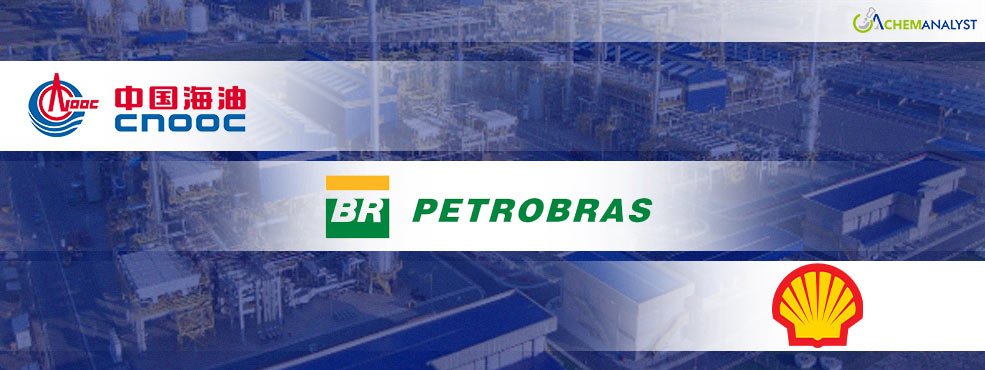Welcome To ChemAnalyst

Additionally, Petrobras entered consortiums with both Shell and CNOOC Petroleum for the remaining three blocks. This significant acquisition underscores Petrobras's strategic efforts to expand its operations in the Pelotas Basin, a region increasingly recognized for its potential in oil and gas exploration. The collaboration with well-established international players like Shell and CNOOC further enhances the technological and operational capabilities expected to be applied in these new ventures.
On the same day, the company signed 26 concession contracts for blocks where it retains a 70% ownership stake, with its partner Shell holding the remaining 30%. These contracts pertain to the following blocks: P-M-1277, P-M-1279, P-M-1281, P-M-1361, P-M-1363, P-M-1441, P-M-1443, P-M-1357, P-M-1359, P-M-1439, P-M-1516, P-M-1518, P-M-1595, P-M-1597, P-M-1793, P-M-1795, P-M-1838, P-M-1840, P-M-1520, P-M-1522, P-M-1599, P-M-1674, P-M-1676, P-M-1678, P-M-1743, and P-M-1799. This strategic partnership with Shell not only strengthens Petrobras's foothold in the Pelotas Basin but also enhances collaborative efforts in exploration and production activities in the region.
According to the Brazilian state-owned energy giant, contracts for the three remaining blocks—P-M-1737, P-M-1739, and P-M-1797—in the Pelotas Basin have now also been finalized. In this consortium arrangement, Petrobras will take on the role of the operator, holding a 50% ownership stake. Shell and CNOOC will serve as partners, holding 30% and 20% stakes, respectively.
This partnership not only consolidates Petrobras's leadership within the consortium but also enhances collaborative efforts with Shell and CNOOC, both of which bring significant expertise and resources to the table. The inclusion of these three additional blocks expands the consortium's presence in the Pelotas Basin, which is increasingly recognized for its exploration potential.
By leveraging the combined strengths of these three companies, the consortium is well-positioned to undertake exploration and production activities in this promising offshore region. This strategic collaboration aims to maximize resource extraction while adhering to best practices in safety and environmental stewardship. Furthermore, the expansion of operations in the Pelotas Basin is expected to contribute positively to Brazil's energy landscape, supporting domestic production and potentially increasing the country's export capabilities in the global energy market. Overall, this partnership represents a significant step forward in Brazil’s efforts to harness its natural resources effectively.
“The signing of these contracts aligns with the company’s long-term strategy aimed at diversifying its portfolio,” the firm explained. “It also reinforces Petrobras' position as the leading operator of oil fields situated in deep and ultra-deep waters, enhancing the potential for future reserve replenishment.” This strategic move is part of Petrobras's broader initiative to expand its operational capabilities and ensure sustainable growth in the competitive energy sector. By focusing on deep-water exploration, the company aims to tap into significant resources that can contribute to its long-term viability and support Brazil’s energy independence.
The expansion of Petrobras's portfolio aligns with its strategic plan for 2024-2028, which emphasizes oil and natural gas as central elements of its investment strategy. This focus positions these sectors to receive the largest portion of the planned $102 billion investment budget, underscoring the company’s commitment to strengthening its core operations.
Petrobras views oil and gas not only as essential drivers of immediate growth but also as critical resources that will help fund the transition to more sustainable energy sources. The company aims to leverage its existing assets to generate revenue that can be reinvested in greener technologies and initiatives.
In support of this strategy, Petrobras plans to deploy 14 new Floating Production Storage and Offloading (FPSO) vessels over the next five years. This ambitious investment in state-of-the-art infrastructure is designed to enhance production capabilities, improve operational efficiency, and increase the overall capacity for deep-water exploration. By expanding its fleet of FPSOs, Petrobras aims to maintain its competitive edge in the market while also positioning itself as a key player in the transition toward a more diversified and sustainable energy portfolio. This approach reflects a forward-thinking strategy that balances immediate resource extraction with long-term sustainability goals.
We use cookies to deliver the best possible experience on our website. To learn more, visit our Privacy Policy. By continuing to use this site or by closing this box, you consent to our use of cookies. More info.
